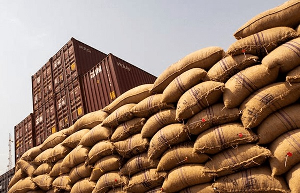Accra (Greater Accra), 14 Jan. '99 -
A Medium Term Expenditure Framework Budgeting System under which a three-year budget framework is announced each year has been used in preparing this year's budget, President Jerry Rawlings said today.
Under the new system, the first year of the budget will be binding while the remaining two will be indicative.
The President said this in his Sessional Address to Parliament in Accra.
President Rawlings said the new system had been utilised in preparing the 1999 budget, yet to be read, "with a remarkable level of understanding and compliance."
He said the Ministry of Finance will provide a quarterly performance review for the assessment of progress and identification of strengths and weaknesses at regular intervals for timely adjustments to be made.
The following are highlights of his address: -
Economy -- Notwithstanding the difficulties encountered in 1998 the economy recorded some remarkable achievements. Inflation continued its decline trend throughout 1998.
For the second year running, interest rates followed the declining trend of inflation.
The days of turbulence in the foreign exchange markets are hopefully over and resources that were used to speculate on the foreign exchange market will now be diverted into productive economic ventures
The objective of achieving a balanced budget by the year 2,001 is still a priority.
Efforts at strengthening the framework of revenue mobilisation will continue.
Problems arising out of the implementation of the Value Added Tax are being addressed.
The pilot programme of reform of subvented agencies already in progress will be completed and a firm decision made regarding those to be commercialised, closed down or continued on the government budget.
Agriculture:- Cocoa production in 1998/99 is likely to drop slightly below 400,000 tons, from 409,000 tons in 1997/98, because of poor weather during the formation of the crop.
Production of staple food items was better than expected in spite of erratic weather pattern during 1998. The decline in the production of maize in Central, Volta and Brong Ahafo regions was partly compensated by significant increase in production in the Eastern region.
Food production in the major food commodities in the Northern Sector is expected to outstrip the previous year's levels.
Total number of livestock increased and slightly exceeded the target of 6.5 million set for 1998.
Overall fish production showed a positive trend and this is expected to continue .
Simple irrigation systems are to be introduced from Israel and United States.
The Pre-Appraisal of the Extension, Livestock and Research components of the Agricultural Services Sector Investment Programme (AGSSIP) began in November 1998 will be completed by May 1999.
The Youth in Agriculture Programme and the Public Servants' Farming Scheme will now take off in the 1999 farming season.
President Rawlings said despite the erratic weather pattern experienced last year, production of staple food items was better than expected.
Compared to 1997, maize production is likely to show a decline in Western, Central, Volta and Brong-Ahafo Regions. However, a significant increase in Eastern Region's output will partly compensate for the shortfall from the other regions.
Production of other crops except rice is expected to increase by between four per cent and 20 per cent. Rice recorded a marginal decline of about 1.2 percent.
In the northern sector, production of major food items is expected to outstrip the previous year's levels. Compared to 1997, cereal production from the three northern regions will increase modestly.
Countrywide, cereal production will show a deficit of half a million tons. This deficit will be offset by an estimated surplus of 3.8 million tons of cassava, yam, cocoyam and plantain.
President Rawlings said livestock exceeded the target of 6.5 million set for 1998.
In poultry, high fluctuations in the prices of ingredients for feed, high interest rates and import competition slowed rapid development.
In the fishing industry, the government managed to rationalise the importation of trawlers, thus reducing over-fishing. ''With the control of the fishing fleet, various stocks began to recover. This is expected to continue in 1999'', the President said.
President Rawlings said Technoserve, a US non- governmental organisation, was supported to import 10 tonnes of high yielding Brazilian cashew nuts from Nigeria to plant about 10,000 acres of cashew nuts and the trees will start bearing fruit in two to three years.
He said experts have been invited from Israel and the US to introduce simple irrigation systems that can be adapted by small-scale farmers.
The President said the Youth in Agriculture Programme (YAP) and the Public Servants' Farming Scheme could both not rpt not take off in 1998 as envisaged. ''The bottlenecks having been removed, however, YAP will take off during the 1999 farming season with emphasis on the cultivation of exportable mangoes, cashew and pawpaw'', the President said.
General News of Thursday, 14 January 1999
Source: --












